How England's Top Flight Became Europe's Super League
The Premier League's financial dominance
Much has been said about this summer's transfer window and how the spending has hit another level. It seemed like Fabrizio Romano typed out his famous, "Here we go!" on social media every hour. It certainly was the case over the last two days before the window closed. So much was happening that it was difficult to keep up. The thing that stuck out this summer was how all the big signings seemed to be going to the Premier League.
Alexander Isak - Liverpool, €145m
Florian Wirtz - Liverpool, €125m
Hugo Ekitiké - Liverpool, €95m
Benjamin šeško - Man Utd, €76.5m
Nick Woltemade - Newcastle, €75m
Bryan Mbeumo - Man Utd, €75m
Matheus Cunha - Man Utd, €74.2m
Martin Zubimendi - Arsenal, €70m
Eberechi Eze - Arsenal, €69.3m
Viktor Gyökeres - Arsenal, €65.8m
Xavi Simons - Tottenham, €65m
Mohammed Kudus - Tottenham, €63.8m
João Pedro - Chelsea, €63.7m
These names account for 13 of the top 16 signings by transfer fees this summer. It's almost as if other European leagues have become feeder leagues for the Premier League. With this seismic shift happening, the time has come to revisit the idea of a European Super League.
Let me explain.
While it would be exciting to see Real Madrid vs Chelsea on a random weekend in late August, we still essentially get that in the current iteration of the Champions League—it just starts a month later.
Instead, we are witnessing a European Super League being consolidated within the Premier League. This is due to the Premier League's significant spending power compared to other top European leagues. Just check out this crazy tidbit from Serie A in depth:
According to Transfermarkt, nine of the top 10 club spenders in the world came from the Premier League this summer. If you expand this to the top 25 spenders, 14 came from the Premier League. This isn't just a one-off summer spending spree for Premier League teams either.
If you zoom out and look from the 2019/20 season through present day, the Premier League holds eight of the top 10 spending spots and 12 of the top 25.
This spending power shift towards the Premier League hasn't always existed. Examining spending between the 2014/15 and 2018/19 seasons, only four of the top 10 spenders were from the Premier League. Among the top 25, 10 resided in England.
Looking back even further from 2000/01 to 2013/14, approximately half (5) of the top 10 spenders and eight of the top 25 were from the Premier League.
Over the past 25 years, spending was much more balanced across the top five European leagues. But today, the Premier League dominates.
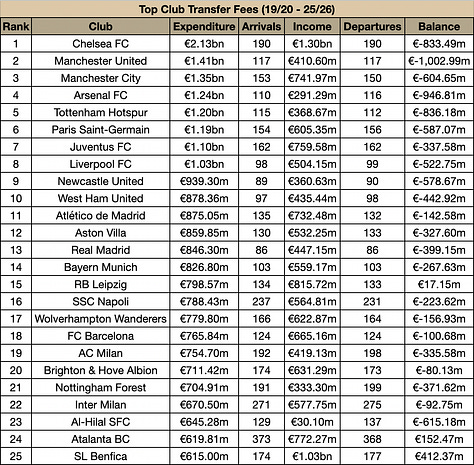
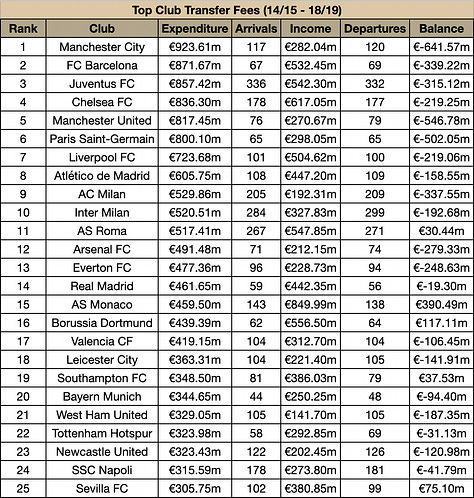
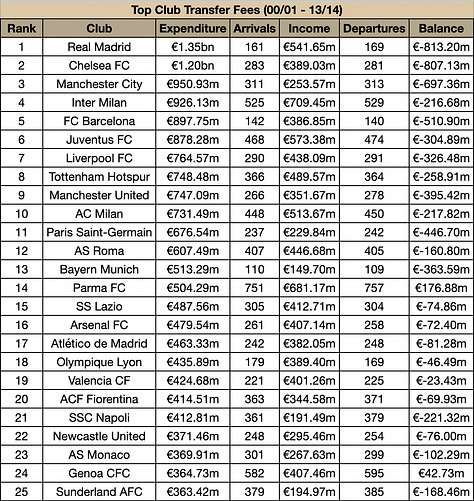
As long as spending power continues to be concentrated in the Premier League, more Premier League teams will be superior on the field.
Consider last year's Europa League Final, the second-best European tournament trophy. Tottenham defeated Manchester United, two teams that finished 15th and 17th in the Premier League table. Despite winning the tournament, Tottenham finished with 38 points and was just one spot away from being relegated.
Now, could teams like Crystal Palace or Bournemouth compete for a Serie A title? Eh, probably not right now. However, the trend appears to be going in that direction. It might be difficult to imagine a mid-table team in England competing for a title in Italy, Germany, France, or Spain, but consider the data.
Examining the differences in player payrolls across the top five leagues reveals stark disparities. The median payroll for a Premier League team is €30 million more than the next closest league (Serie A). In fact, all Premier League clubs outside of the three recently promoted (Leeds, Burnley, Sunderland) are among the top 41 club payrolls across the top five European Leagues.
Remarkably, when comparing median payrolls, Ligue 1 has smaller salaries than England's second-tier league, the EFL Championship.
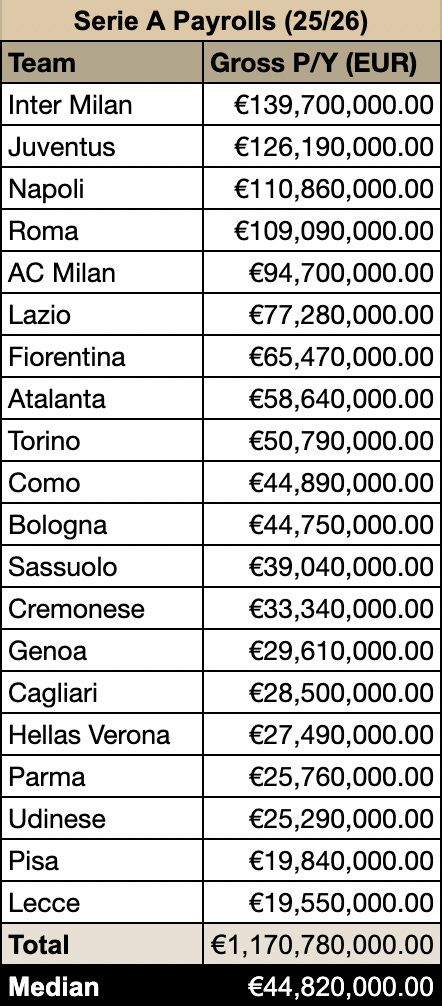
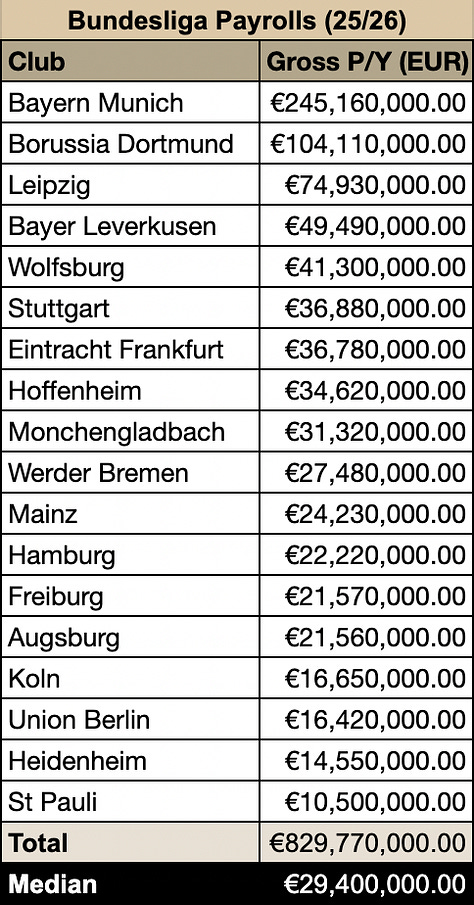
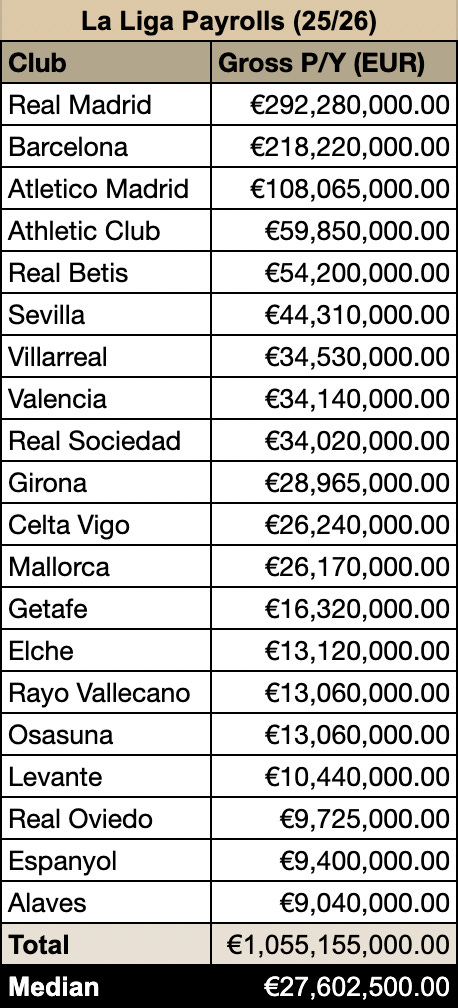
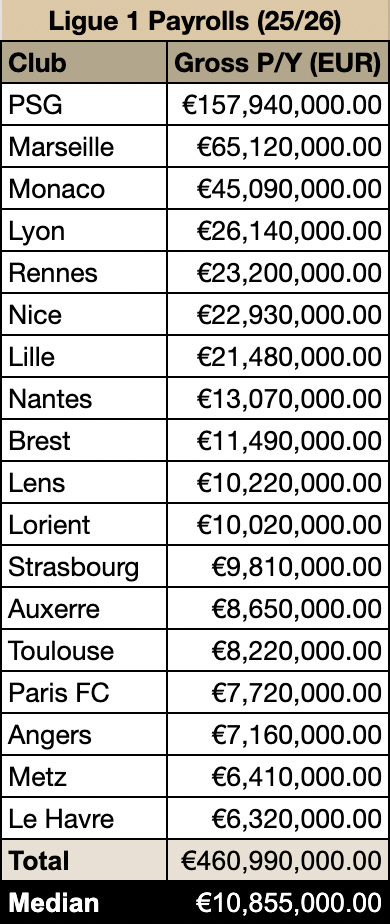
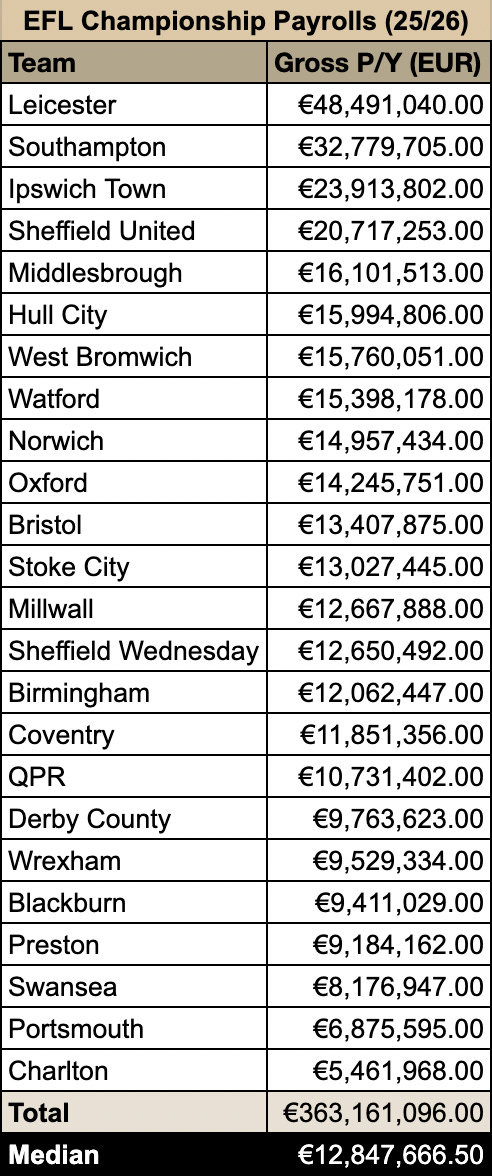
One reason for the higher pay is that owners in England are richer than those in other countries. A brief Google Search reveals that the Premier League dominates the list of richest owners. As long as owners are wealthier, players will be paid more, and talent will migrate to where the money resides. Players want to maximize their earnings, compete at the highest level, and prove that they belong among the best. Right now, the Premier League increasingly attracts top talent.
The bigger question becomes how teams outside of England stay competitive. Outside of the Premier League, there are really only 10-13 clubs that are considered big in terms of spending and payroll. Outside of those select clubs, we'll continue to see a widening on the field.
Now, all of this can change if new investors or owners swoop in and buy smaller clubs. However, I expect new investors would prefer to put their money into a Premier League club. Let's face it, the Premier League has everything going for it to continue growing as a capitalist powerhouse.
It is the most-watched soccer league in the world, broadcast in over 200 countries. It’s the default international product, whereas other top leagues (La Liga, Serie A, Bundesliga, Ligue 1) are far more regional in appeal.
The fact that the Premier League is English-centric helps with its appeal in the world's most wealthy market, the United States. Commentary, interviews, analysis, and internet blogs are all produced in English, making them easy for Americans to understand and follow.
Importantly, the Premier League is accessible in the U.S. market. Over 50 million Americans now watch international soccer leagues, and 72% of those 50 million tune in to the Premier League.
The Premier League has the biggest TV rights deals domestically and internationally compared to the other top European leagues. American viewership through the Premier League's deal with NBC and Peacock continues to grow each year. In terms of all revenue generated, Premier League clubs earn about 60% more than Bundesliga clubs and more than three times more than Serie A and La Liga clubs.
Everyone knows the financial challenges of operating a European club nowadays, but English clubs have a built-in advantage by playing in the Premier League.
For domestic leagues in Europe, financial dominance has shifted toward England. The European soccer landscape doesn't look the same as it did 10 years ago, and I bet it will continue to lean more heavily toward England 10 years from now. For years, soccer's financial powers have been spread across Europe (with more money flowing through Italy in the 80s and 90s). Now, the concentration of wealth and talent in the Premier League has never been greater.
Is this good for the global game? That's open to debate. Does it water down the rest of European soccer? Probably. Is the Premier League more exciting week in and week out? Absolutely.



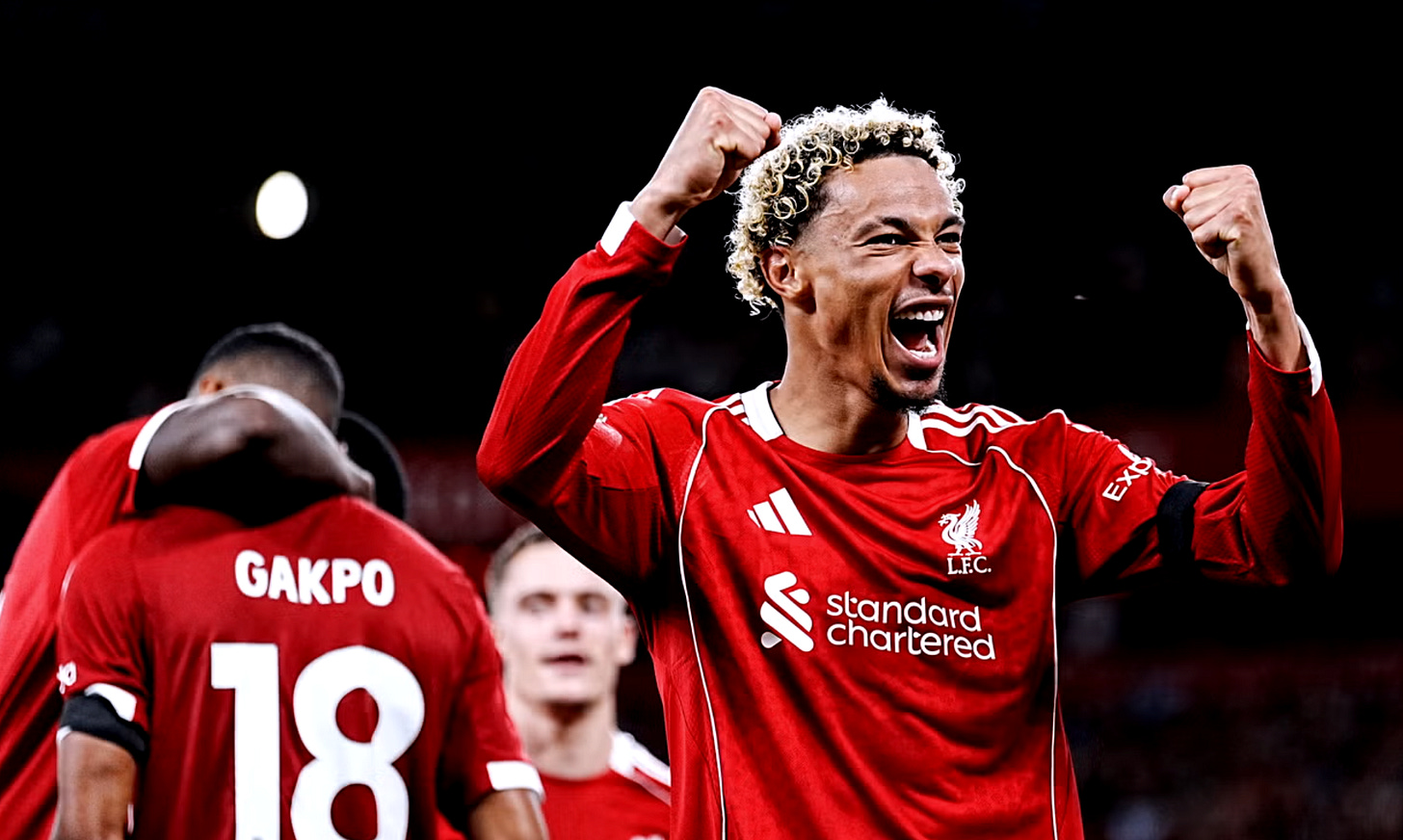
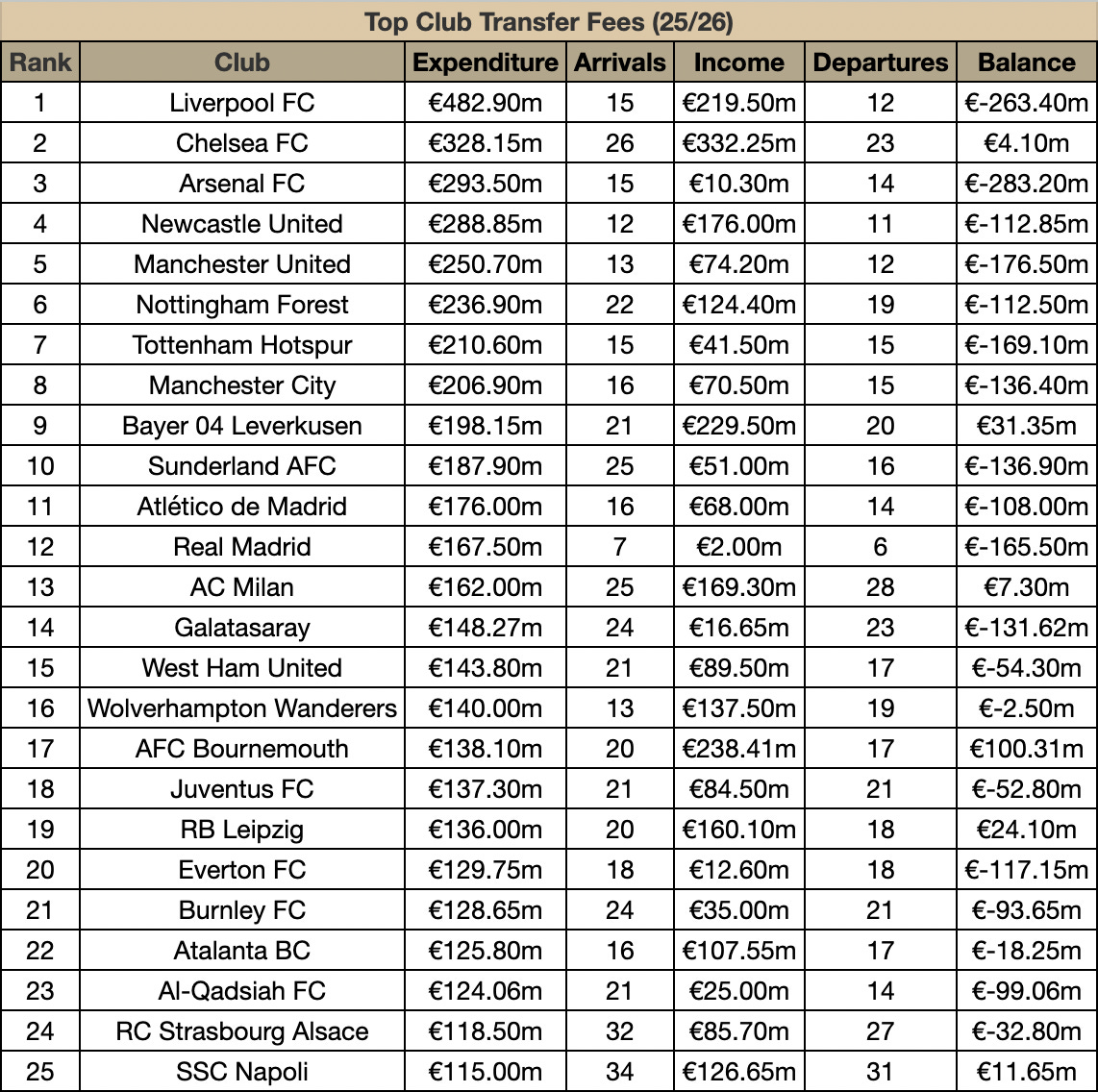
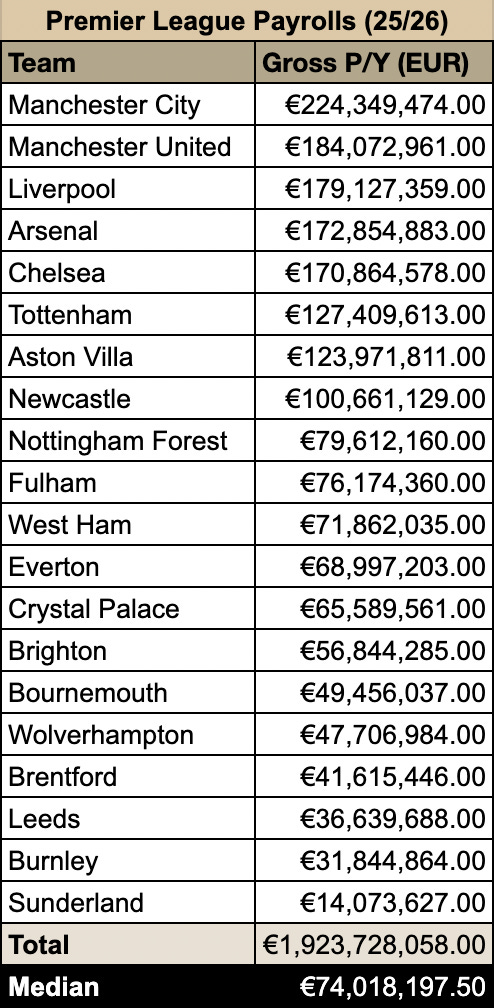
You’re absolutely right, the Premier League’s spending has grown completely out of proportion compared to the rest of Europe. In fact, the only non-English clubs consistently able to compete for elite players are Real Madrid and Barcelona, and even they’ve struggled in recent years due to financial restrictions and debt. What’s striking is that mid-table EPL clubs now often outspend traditional giants from Italy, Germany, and France: for example, West Ham, Aston Villa, and Nottingham Forest have all outspent AC Milan, Borussia Dortmund, and Marseille in recent windows. According to Transfermarkt, nine of the world’s top 10 biggest spenders this summer came from the EPL, and even across the last five seasons, Premier League clubs dominate the global spending charts, making it clear the financial balance of European football has shifted almost entirely to England
Financially, English football clubs have all they could ever ask for. Other teams in leagues across Europe simply cannot compete financially, and the only way to combat this inadequacy is through tactics. English clubs can spend all the money they want, but if teams like Real Madrid, Barcelona, Bayern, PSG, Inter, Juve, and other European giants outside of England can continue to push the top English clubs away from Europe's prestigious trophy (although the smaller Conference league and Europa league will more often than not be fed to English placed teams), there will always be the global appeal that these historic clubs will have that will attract elite players, leading to trophies and success, and ultimately win the eyes of devout football fans which will give them just enough resources to try and compete with England's elite for at least another season.